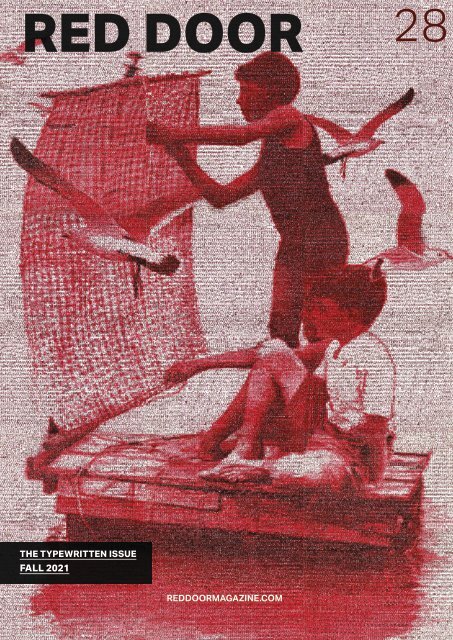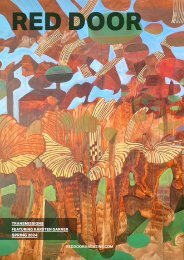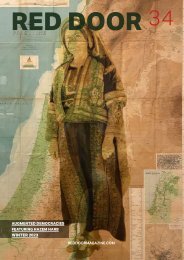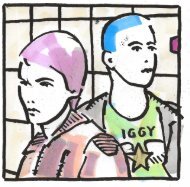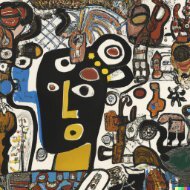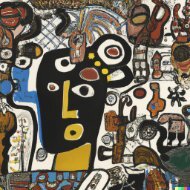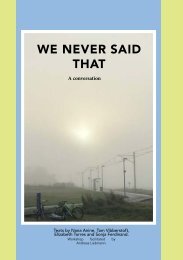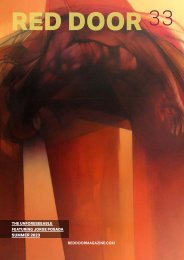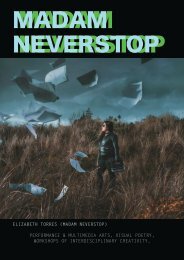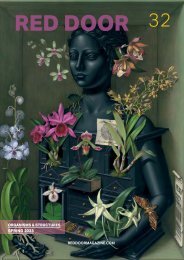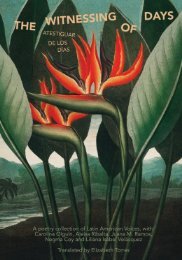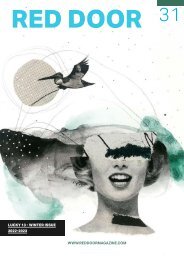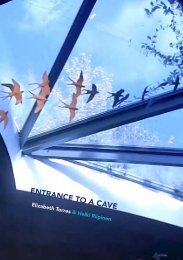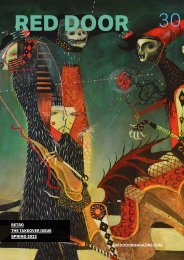Red Door #28 - The TYPEWRITTEN issue
Featuring the art of Hal Wildson Jessica Esch Tim Youd Danni Storm Chad Reynolds Kevin Stebner Martin Andersen Frank Singleton Leo K. Benjamin Paweshi and illustrations by Richard Polt Including poetry by Michael Favala Goldman Cristian Forte Jack Thacker Lani O'Hanton Un Sio San Hasso Krull Simon Nastac Pankhuri Sinha Laurence James and Pablo Saborio As well as the official program of Nature & Culture - International Poetry Festival Red Transmissions Podcast: The Typewriter Revolution Chicano Tribune: Anniversaries and more. In dedication to Red Door correspondent David H. Rambo. www.reddoormagazine.com
Featuring the art of Hal Wildson
Jessica Esch
Tim Youd
Danni Storm
Chad Reynolds
Kevin Stebner
Martin Andersen
Frank Singleton
Leo K.
Benjamin Paweshi
and illustrations by Richard Polt
Including poetry by
Michael Favala Goldman
Cristian Forte
Jack Thacker
Lani O'Hanton
Un Sio San
Hasso Krull
Simon Nastac
Pankhuri Sinha
Laurence James
and Pablo Saborio
As well as the official program of
Nature & Culture - International Poetry Festival
Red Transmissions Podcast:
The Typewriter Revolution
Chicano Tribune: Anniversaries
and more.
In dedication to Red Door correspondent
David H. Rambo.
www.reddoormagazine.com
Create successful ePaper yourself
Turn your PDF publications into a flip-book with our unique Google optimized e-Paper software.
RED DOOR 28<br />
THE <strong>TYPEWRITTEN</strong> ISSUE<br />
FALL 2021<br />
REDDOORMAGAZINE.COM<br />
01
RED<br />
CHAD REYNOLDS<br />
46-49<br />
50-51<br />
KEVIN STEBNER<br />
38-41<br />
FRANK<br />
SINGLETON<br />
02<br />
32-37<br />
TIM YOUD
30-31<br />
HAL WILDSON<br />
12-17<br />
MARTIN ANDERSEN<br />
JESSICA ESCH<br />
42-43<br />
DOOR<br />
03
TABLE OF CONTENTS:<br />
EDITORIAL .........................................................pg.6<br />
FEATURED ARTIST:<br />
Hal Wildson.........................................................pg.12 - 17<br />
NATURE & CULTURE<br />
International Poetry-Film Festival ............. pg.06 - 09<br />
THE TYPEWRITER<br />
REVOLUTION .....................................................pg.19 - 23<br />
RAMBO, you’re a star<br />
In memoriam ......................................................pg.24 - 25<br />
IN THE EYES OF THE BEHOLDER<br />
By Martin Andersen........................... ..............pg.30 - 31<br />
TYPEWRITER ARTISTS:<br />
TIM YOUD............................................................pg.32 - 37<br />
FRANK SINGLETON.........................................pg.38 - 41<br />
JESSICA ESCH...................................................pg.42 - 43<br />
DANNI STORM...................................................pg.44 - 45<br />
CHAD REYNOLDS.............................................pg.46 - 49<br />
KEVIN STEBNER................................................pg.50 - 51<br />
LEO K.....................................................................pg.52<br />
BENJAMIN PAWESHI.......................................pg.53<br />
LITTERATURCENTRUM KVU:<br />
Laurence James - Self Taught Typer........pg.54 - 55<br />
CHICANO TRIBUNE:<br />
Anniversaries......................................................pg.56<br />
POETRY................................................................pg.26 - 29<br />
Michael Favala Goldman, United States<br />
Cristian Forte, Argentina<br />
Jack Thacker<br />
Lani O’Hanton<br />
Un Sio San, Macao<br />
Hasso Krull, Estonia<br />
Simon Nastac<br />
Pankhuri Sinha, India<br />
Pablo Saborio, Costa Rica/DK<br />
<strong>Red</strong> <strong>Door</strong> Magazine <strong>#28</strong><br />
ISBN: 978-87-94003-04-9<br />
<strong>Red</strong> Press, Copenhagen<br />
Cover art by Hal Wildson<br />
Back cover by Tim Youd<br />
Illustrations in poetry segment by Richard Polt<br />
Eyes of the Beholder art by Martin Andersen<br />
04<br />
Editor in chief, designer & art director:<br />
Elizabeth Torres (Madam Neverstop)<br />
www.madamneverstop.com
SUBMIT CONTENT to<br />
RED DOOR MAGAZINE:<br />
<strong>Red</strong> <strong>Door</strong> Magazine releases digital & printed <strong>issue</strong>s<br />
quarterly with an emphasis on visual art and poetry.<br />
It includes multimedia art, essays and articles, and<br />
documentation of the activities by our network,<br />
including you. <strong>The</strong> magazine always features a poetry<br />
selection and occasional interviews by established<br />
and emerging artists as well as upcoming events.<br />
We’re here to give you a handful of essential pieces<br />
you can digest in one sitting, yet of lasting flavor.<br />
We’re currently seeking visual art, music, film reviews,<br />
travel and media articles, poetry, fiction, and creative<br />
nonfiction. Simultaneous submissions are always ok.<br />
If you have a piece accepted elsewhere, please let us<br />
know by adding a note to your submission; we’re not<br />
aiming for exclusivity - but relevant, quality content.<br />
Please send your submission to:<br />
reddoorny@gmail.com<br />
________________________________________<br />
File specifications: Your article may be a maximum<br />
of two pages. We accept a maximum of 4 poems per<br />
submission. All languages are welcome but please<br />
include English translation.<br />
Also include a small biography of up to 10 lines about<br />
you. All this must be submitted as .doc files . All images<br />
must be attached as .jpeg images in a resolution of<br />
1080 x 1080 px or its equivalent in format so it can be<br />
used for print and hi-res for web.<br />
ISSUE #29: the UNINHABITED <strong>issue</strong><br />
(Winter, 2021)<br />
SUBMISSION DUE DATE:<br />
Nov 20, 2021<br />
05
EDITORIAL<br />
YOU’RE MY TYPE<br />
<strong>The</strong> highlight of having an independent magazine<br />
is being able to take it by the hand towards the<br />
subjects one favors. <strong>The</strong>re’s no need for neutrality<br />
here. In my eyes, typewriters are dream machines.<br />
Icons of design and progress, communication and<br />
disconnection, these beautiful objects have traveled<br />
with us through time and helped us tell our<br />
stories, document them and turn them into art.<br />
Typewriters have accompanied me since I wrote my<br />
very first poem as a child, and through time became<br />
a constant, especially since the lucky day when <strong>Red</strong><br />
<strong>Door</strong> correspondent David H.Rambo gifted me a red<br />
Olivetti in New York as he prepared to move back to<br />
Mexico. It was also him who helped me get a custom<br />
painted pink and black Lettera 31 in Mexico and<br />
baptized her “Kitty Olivetti”, teaching me typewriters<br />
had nicknames, like good friends do. Ever since,<br />
I fell down the rabbit hole and now own around 20<br />
Olivettis, an insane number for those outside of the<br />
global typewriter collector club, but quite a humble<br />
number for those within. <strong>The</strong>n came the typewritten<br />
art and the posters, ribbons and collectible objects,<br />
which now fill my home in Denmark and occupied<br />
my lockdown days with clickety happiness.<br />
When I asked the readers of <strong>Red</strong> <strong>Door</strong> to submit<br />
content for this typewritten <strong>issue</strong>, I fell even deeper<br />
into this ink-stained wonderland, admiring the<br />
many stories, letters, photos and art that arrived,<br />
and the roles typewriters play in our lives, from revolutionary<br />
strategies for reclaiming our privacy, to<br />
aesthetic attraction and mental health support.<br />
<strong>The</strong>se are some of the many ways these analog<br />
machines lighten up our lives, and our pockets. But<br />
oh, they’re worth their weight in poetry.<br />
From aiding writers to focus in their projects and<br />
others to disconnect from the constant buzz of this<br />
current social media-obsessed world, to helping<br />
express art and new ideas, and even serving as a<br />
tool for activism, direct action and poetic existences,<br />
(I read in a sticker they even kill fascists), these<br />
dream machines are keeping many of us sane.<br />
Thanks to everyone who submitted content to this<br />
<strong>issue</strong>, but especially to Richard Polt, for his interview<br />
on the Typewriter Revolution (a bible for collectors<br />
and dummies alike) and for the beautiful<br />
illustrations that accompany the poetry segment.<br />
Rambo, the <strong>Red</strong> <strong>Door</strong> correspondent, patreon supporter,<br />
typewriter collector, poet and photographer<br />
fell endlessly asleep at the beginning of October, so<br />
this <strong>issue</strong>, which would’ve been his favorite, is dedicated<br />
to his memory. I have lost my great collaborator<br />
and conspirator in all things Olivetti, but through<br />
him I have learned of a world filled with incredible<br />
artists, dreamers and collectors, who keep giving<br />
back and helping me find the way.<br />
To typewriters, to Rambo, to poetry, and to each<br />
one of you: Thank you. May poetry and ink always<br />
be near.<br />
Elizabeth Torres / Madam Neverstop.<br />
06<br />
Madam Neverstop<br />
& “Puma” Olivetti<br />
Photo by Zarko Ivetic.
07
NATURE & CULTURE<br />
WHEN POETRY<br />
BECOMES THE VOICE<br />
OF REASON<br />
Nature & Culture – International Poetry Film Festival<br />
takes over Islands Brygge this November<br />
08<br />
Performing arts and activism<br />
often go hand in hand, used as<br />
tools to deliver messages in need<br />
of their voices being represented.<br />
In this case, it isn’t a voice or a<br />
minority, but an entire planet that<br />
needs to be spoken for by those<br />
inhabiting it… <strong>The</strong> main threading<br />
line being poetry in interdisciplinary<br />
media.<br />
That is the concept behind<br />
“Nature & Culture – International<br />
Poetry Film Festival”, an idea<br />
that began during early spring<br />
as a collaboration between Kulturhuset<br />
Islands Brygge and <strong>Red</strong><br />
<strong>Door</strong> Gallery’s project <strong>The</strong> Poetic<br />
Phonotheque. <strong>The</strong> festival<br />
received almost 300 films, from<br />
over 50 locations, such as Egypt,<br />
Kosovo, Argentina, Iraq, Taiwan,<br />
Australia, as well as many from<br />
Scandinavia.<br />
<strong>The</strong> selection of 128 f ilms, made<br />
by artist Christina Jonsson and<br />
lecturer Solveig Willum, is divided<br />
into the genres of Poetry Film,<br />
Animation, Short Film, Experimental,<br />
and Documentary, and will be<br />
screened at Kulturhuset Islands<br />
Brygge in Copenhagen on Sunday,<br />
November 21 and on Sunday,<br />
November 28.<br />
<strong>The</strong> event includes an exhibition<br />
titled “Colors for Climate” by international<br />
artist Rita Howis, as well<br />
as a collaboration with Extinction<br />
Rebellion who will do a talk on<br />
each day of the festival.<br />
Posters for the festival by artist<br />
Leonardo Flores, and the visual<br />
identity of the accompanying<br />
book, as well as the illustrations,<br />
by artist Rikke Winkler Nilsson.
A number of the filmmakers will<br />
arrive to Copenhagen to talk<br />
about their productions and give<br />
insight into their creative process<br />
as part of the program, as<br />
well as as recorded interviews<br />
for <strong>Red</strong> Transmissions Podcast<br />
airing on Tremella Radio.<br />
<strong>The</strong> general public is invited to<br />
follow Kulturhuset Islands Brygge’s<br />
website and social media,<br />
and to save the date of the FREE<br />
admission festival, which will be<br />
screened virtually and onsite at:<br />
Kulturhuset Islands Brygge –<br />
Islands Brygge 18, 2300,<br />
Copenhagen S, Denmark<br />
November 21 & 28, 2021<br />
See the LIVE program on the following<br />
pages and add your voice<br />
to the Poetic Phonotheque’s<br />
growing collection of audio and<br />
video, which now includes over<br />
200 files sent from all over the<br />
world. You can record your poem<br />
directly at:<br />
www.poeticphonotheque.com<br />
or send your files to<br />
poetiskefonotek@gmail.com<br />
<strong>The</strong> official location for the phonotheque<br />
in Denmark is Kulturhuset<br />
Islands Brygge, and in<br />
Sweden Litteraturcentrum KVU/<br />
Kultiver in Tranås.<br />
If you are a cultural organizer,<br />
have a poetry/film festival or<br />
would like to find ways to collaborate<br />
and house the phonotheque<br />
in your city,, please write to the<br />
email above.<br />
www.kulturhusetislandsbrygge.kk.dk/<br />
09
010
011
FEATURED ARTIST<br />
HAL<br />
WILDSON<br />
012
Focused on art, urban interventions<br />
and creative projects that cause<br />
a response and interactions<br />
amongst people, as well as the<br />
documentation of the stories of<br />
his culture, Hal Wildson (1991) is a<br />
writer and visual artist from Golás,<br />
Brazil, taking the art world by storm<br />
through his typewriter art.<br />
Combining intense key work,<br />
hidden messages and wordplay as<br />
well as abstract spaces, dealing the<br />
subjects of social consciousness<br />
and memory, Wildson has<br />
created his very own aesthetic<br />
that surpasses the traditional<br />
typewritten portraits and enters<br />
into the realm of masterwork of<br />
exceptional technical process,<br />
diverse materials and a wide range<br />
of thematic expressions.<br />
Eloquent in his use of social<br />
media to promote his work and<br />
activism, the videos on his facebook<br />
and instagram are hypnotic<br />
scenes of Olivetti typewriters<br />
slaving away rhythmically, ignoring<br />
the bell sounds and spilling<br />
ink over the edge of each intricately<br />
colorful A4 page, creating<br />
a puzzle of dozens of brightly patterned<br />
pages which, once reconnected,<br />
bring forth scenes of<br />
contrasting beauty which simultaneously<br />
encourage important<br />
conversations, revealing visual<br />
capsules from historic moments<br />
to moving narratives of his people.<br />
But his messages aren’t passive<br />
activism.<br />
Hal Wildson uses these platforms,<br />
with over 50 thousand<br />
followers, as documentation of<br />
his artistic practice, behind-thescenes<br />
process, and messages<br />
of support to the indigenous people’s<br />
struggle in Brazil against<br />
predatory economic exploitation,<br />
inequality and the memories<br />
of the ancestors.<br />
<strong>The</strong> texts, often autobiographical<br />
letters, articles of interest,<br />
or historical notations typed on<br />
paper, build a weft of letters and<br />
words that get lost in the immensity<br />
of thousands of characters<br />
which together reveal imagery<br />
but separate are stunning pieces<br />
of art. “We are made by what we<br />
remember and shaped by what<br />
we forget” says the artist, speaking<br />
on the subject of “reconstructing”<br />
the future, which<br />
inspires his work.<br />
Series and works with titles<br />
such as “Letters from infance<br />
and memory” (left) and “Amidst<br />
the Ruins” (the scene of the<br />
child reading the book on the<br />
table of contents of this <strong>issue</strong> of<br />
<strong>Red</strong> <strong>Door</strong>), hopefully but sharply<br />
speak of our responsibility of<br />
remembering, as an act of reconstruction<br />
and rebuilding a future<br />
together.<br />
instagram.com/halwildson<br />
013
014
015
016
017
A most exciting new project launched this summer in Denmark / Sweden, led by <strong>Red</strong> <strong>Door</strong> but<br />
founded as a democratically run and managed community radio station, with a focus on literature,<br />
sustainability, sound art, mental health and wellness, as well as performance arts and independent<br />
music.<br />
Tremella is the name of a family of fungi that is often ear-shaped, but also sounds a lot like Tremello,<br />
a modulation effect that rhythmically changes the volume of your signal... It all just seemed very<br />
fitting for the name of a radio station with the aforementioned interests.<br />
<strong>The</strong>re’s a little bit of everything, from the classic Orson Welles plays for radio to a show by the<br />
International Centre of Women Playrights, several shows by poets, including Foreignness and<br />
Friendship by poet Morten Ranum, Monday Madness by Claus Andersen, the Poetic Phonotheque<br />
and <strong>Red</strong> Transmissions, as well as various sound art shows, talk shows about mental health and<br />
wellness, and playlists by venues and DJs in our network. Tune in via: www.tremellaradio.eu<br />
Or even better, join us with your own show! Write to tremellaradio@gmail.com for more info.<br />
018
019
RED TRANSMISSIONS PODCAST<br />
THE TYPEWRITER<br />
REVOLUTION<br />
020
An interview<br />
with Richard Polt<br />
by Madam Neverstop.<br />
An interview released this spring<br />
via <strong>Red</strong> Transmissions podcast<br />
announced the open call for this fall<br />
<strong>TYPEWRITTEN</strong> <strong>issue</strong> of <strong>Red</strong> <strong>Door</strong>,<br />
with a very special guest, who spoke<br />
to me from Ohio, with typewriters on<br />
his desk and in the background, in<br />
case there was any doubt on the subject.<br />
Professor of philosophy, Associate<br />
Dean of the College of Arts and<br />
Sciences at Xavier University in Ohio,<br />
author and typewriter collector Richard<br />
Polt.<br />
Originally from California and raised<br />
bilingually due to his Spanish background,<br />
Polt shares that his father<br />
used a Smith corona so his upbringing<br />
in Oakland was always surrounded by<br />
typewriters. That is to say, we jumped<br />
straight to the important subject.<br />
Speaking of his collection, Polt shares<br />
that he has approx. 300 typewriters,<br />
which have always been a part of his<br />
life but which he began seriously collecting<br />
once he dug into the history of<br />
early typewriters and the strange original<br />
designs and concepts of these<br />
machines, leading to him to create a<br />
website called the Classic Typewriter<br />
Page, which has served to connect<br />
fanatics/collectors around the world.<br />
<strong>The</strong> number of the collection is a bit<br />
uncertain, as in reality his attempt to<br />
cut down failed or was put aside for a<br />
better cause, as apart from his personal<br />
collection, his basement is full of<br />
typewriters which he is restoring and<br />
preparing for literacy programs for the<br />
youth in his city.<br />
<strong>The</strong> Typewriter Revolution came out<br />
in 2015, a beautiful publication visually<br />
and rich in content, which started<br />
due to a typewritten blog, (a practice<br />
called typecasting) which he started<br />
in 2010 and which connected him to<br />
typewriter users of the 21st century,<br />
something which felt rebellious, inspiring<br />
and hopeful, and which showed<br />
him simultaneously all the negative<br />
ways in which digital technologies are<br />
occupying our lives.<br />
He typed up the typewriter manifesto<br />
about the rebellion and revolution<br />
as a tongue-in-cheek text. This turned<br />
into a movement of supporters which<br />
he chose to encourage through the<br />
book, which many of us consider “the<br />
bible” for the typewriting subculture.<br />
Polt shares that there are aren’t yet<br />
book versions in other languages but<br />
that there’s talks of releasing it in Italian.<br />
I In addition to this publishing project,<br />
Polt has also been publishing academic<br />
texts, but there is now a whole<br />
other collection of typewriter-themed<br />
books, a series called Cold Hard Type,<br />
to encourage people to use their typewriters<br />
through various themes, such<br />
021
as fiction, horror and time travel, which<br />
invite people to share stories, poems,<br />
art and texts written on typewriters.<br />
I asked Polt about the strange stories<br />
involving typewriters in our real<br />
world, such as the German government<br />
beginning to use typewriters<br />
once they realized the US was spying<br />
on their digital communications,<br />
and he shared that during OCCUPY<br />
Wall Street there were events occurring<br />
of people lending their typewriters<br />
to the crowd to share their experiences<br />
and thoughts, in part because<br />
of the novelty, in part because of the<br />
anonymity. “It’s a sort of combination<br />
of privacy and public communication”<br />
he explains, which is useful for activism,<br />
while also remaining connected<br />
to practical or more romantic matters.<br />
“Love and friendship letters are very<br />
common, just the fact that you and<br />
the receiver are the only people who<br />
have ever seen this, because it’s one<br />
and the same object, same ink, which<br />
is no longer true in digital technology.<br />
It is a single copy rather than multiple<br />
copies that who knows who else can<br />
read... it creates a self-consciousness<br />
about others looking over your shoulder.<br />
Just the act of sending a physical<br />
object that took trouble and time to<br />
create is an expression of care, even is<br />
the content is a trivial ‘Hello, How are<br />
you?’, people really appreciate them.”<br />
Other uses in our current international<br />
community in public spaces, such as<br />
poetry by request, allows for conversations<br />
amongst strangers and new<br />
022
connections, writing on typewriters to<br />
disconnect completely, and of course<br />
art, as you can see long these pages.<br />
<strong>The</strong> resurgence of typewriting, Polt<br />
explains, is probably due to the extensive<br />
expansion of digital communication<br />
in our lives, so that these typewriters<br />
aren’t just part of the subculture<br />
but currently playing an active part in<br />
writing our stories.<br />
Typewriters history is connected to<br />
many aspects of our own society,<br />
from war to feminism, as some of the<br />
first opportunities for women to enter<br />
the workforce were due to the need<br />
of secretaries in offices and government<br />
places. Polt explains that he isn’t<br />
just collecting typewriters because of<br />
their aesthetic beauty. He is interested<br />
in the process of cleaning them, fixing<br />
them, using them, understanding<br />
them mechanically, looking into the<br />
history of the people who made them.<br />
This episode of the <strong>Red</strong> Transmissions<br />
Podcasts can be heard on the<br />
website of <strong>Red</strong> <strong>Door</strong> magazine, as well<br />
as on iTunes, Spotify, and most podcast<br />
providers.<br />
Special thanks to Richard Polt once<br />
again for this interview, as well as for<br />
the typewriter photos in this magazine<br />
and the beautiful illustrations included<br />
in the poetry section of this publication,<br />
which were originally created<br />
for the Typewriter Revolution, but having<br />
not made the cut, have found their<br />
new home within these pages.<br />
023
IN MEMORIAM<br />
<strong>The</strong> streets of the city<br />
grab me<br />
I go out to step on them for no reason<br />
I find myself<br />
I hide in the masses<br />
I lose myself in their presence<br />
desire<br />
is erased<br />
I go on by pure inertia<br />
day by day I consume<br />
it consumes me<br />
the truth is so far away<br />
I try to understand<br />
my own fiction<br />
words that form lines<br />
lines that form streets<br />
I step on again<br />
I flee searching<br />
I seek to flee.<br />
024
DAVID (H)<br />
RAMBO<br />
<strong>The</strong> chair and Penny Olivetti<br />
My dearest:<br />
Death is knowing that today you are<br />
you<br />
And tomorrow you’ll be<br />
an uncomfortable chair.<br />
Nomad, amateur artist and experimental-ego,<br />
Rambo sealed his entrance to the<br />
world on the 47th day of 1983; He participated<br />
in countless poetry and cultural<br />
intervention events internationally and<br />
was a correspondent of <strong>Red</strong> <strong>Door</strong> Magazine<br />
since 2012. He dedicated his life to<br />
enjoying the world, typewriters and his<br />
friends, to art, hyper-absurdist alterations<br />
of social spheres, professional translation<br />
(Spanish, English), and writing. He validated<br />
his return ticket to the cosmos on the<br />
276th day of 2021 and is already gravely<br />
missed by those who loved him.<br />
Here I begin,<br />
from the middle.<br />
I open pages<br />
among a past<br />
full of a person long gone,<br />
I illuminate a light year;<br />
I come to a point:<br />
pause,<br />
coma,<br />
return.<br />
Methodical time machine:<br />
a past;<br />
the present.<br />
See?<br />
Comfort resides in a free space,<br />
a small intimate space<br />
that relaxes the moments,<br />
caresses the seconds<br />
floats in the unknowing,<br />
flirts with the arrival of Morpheus;<br />
dreams loose in space;<br />
cushions the walls:<br />
embraces.<br />
So many nights supporting my<br />
weight;<br />
comfort.<br />
Thank you chair, for everything.<br />
Sincerely yours:<br />
Penny Olivetti<br />
Left: illustration by Madam Neverstop<br />
Right: self-portrait.<br />
025
POETRY<br />
Privilege<br />
Michael Favala Goldman<br />
United States<br />
Trees are not greedy.<br />
<strong>The</strong>y collaborate,<br />
make just enough leaves.<br />
Cheetahs are not greedy.<br />
<strong>The</strong>y don’t hunt<br />
any more than necessary.<br />
I am not greedy.<br />
I just don’t know the difference<br />
between need and want.<br />
A delightful<br />
misunderstanding<br />
026<br />
Illustrations by<br />
Richard Polt.<br />
Cristian Forte<br />
Argentina<br />
I never thought about<br />
the particles that don’t come out of<br />
power plants and automobiles<br />
it was an astounding place<br />
full of wonder, magic, and exquisite personal<br />
style<br />
I was delighted by the decorations and the way i<br />
was treated<br />
and the people i was travelling with were also<br />
delighted<br />
I had been using my hydrating lotion for normal<br />
skin types<br />
but when i set off for home for christmas<br />
to visit my family, i immediately noticed that my<br />
skin<br />
was again getting irritated<br />
I never thought about cosmetic pollution<br />
the particles that don’t come<br />
from power plants and<br />
automobiles
What is grass?<br />
<strong>The</strong>re’s a god in the grass<br />
and it tells us our purpose<br />
which is to tear it all up, bit by bit.<br />
All day we take our communion.<br />
We inhabit a holy carpet.<br />
<strong>The</strong>re’s a voice in the trees<br />
and a drone in the sky. To eat,<br />
to sleep, to stand and try to die<br />
is our purgatory. It’s easy enough<br />
to say it – ‘weather’ is a verb.<br />
We go along with rituals.<br />
We entertain possibilities.<br />
Dust rises. Fresh grass. We know<br />
where we are going and will go<br />
in our time – unless pushed.<br />
We are held. We are patient.<br />
<strong>The</strong> operation is tolerated.<br />
Resistance is offered – otherwise<br />
it would be obvious. We are<br />
handled. We struggle. We dig in.<br />
<strong>The</strong>re is a thing we learn and<br />
it comes to us naturally.<br />
Jack Thacker<br />
United Kingdom<br />
Going to the Well<br />
Lani O’Hanlon<br />
Ireland<br />
Soon<br />
we return freely to the green<br />
of our eyes, of our minds<br />
and lower our heads to it.<br />
We understand how to suffer –<br />
maggots, blindness, foot rot, worms,<br />
loneliness, yes, and mastitis.<br />
We are, despite it all, used<br />
to it all and its violence.<br />
Three wells,<br />
as in a fairytale;<br />
the first well is dry,<br />
the second well is dry,<br />
the third well is dry.<br />
A woman asks if there is a well committee<br />
someone to tell us where the water went.<br />
We are thirsty then,<br />
desperate for a drink.<br />
A woman climbs down into the well<br />
begins to dig with an old tin cup.<br />
We wait for a trickle<br />
some hint of moisture to wet our lips<br />
with whatever cure is here.<br />
She holds it up,<br />
we lean forward to see<br />
but in the cup there is only money.<br />
027
POETRY<br />
I dreamt I was watching<br />
a disaster film<br />
Un Sio San<br />
Macao<br />
Translated by Jeremy Tiang<br />
I bought popcorn and picked my seat –<br />
slightly left of center –<br />
No one had brought a kid along.<br />
Anyway, this wasn’t real.<br />
Close up: a Mumbai track shoe factory,<br />
a child worker.<br />
He’s learned Math, the English alphabet,<br />
this world and the third world,<br />
the bleeding of his fingers a red pen correcting<br />
his worth.<br />
028<br />
<strong>The</strong> woods<br />
Hasso Krull<br />
Estonia<br />
Translated by Adam Cullen<br />
It’s very still here today.<br />
No saws rumble today, no harvester whines,<br />
there’s no one here. Not even trees.<br />
Can anyone spot an animal anywhere?<br />
No. No animals tread here.<br />
It’s long since any beasts have prowled this<br />
place,<br />
not even werewolves. Only<br />
the forest.<br />
In this forest, there’s not even wind.<br />
This forest doesn’t rustle. No twigs snap,<br />
no leaves fall, no splintered trunks squawk,<br />
not a single bird sings anywhere.<br />
This is an Estonian forest.<br />
Listen to the sound of silence. Listen in<br />
silence.<br />
Listen to the way it softly whines, to the way<br />
it whimpers,<br />
to the way it wishes to say something but<br />
can’t,<br />
to the way it buzzes like a mosquito.<br />
Listen to the booming of silence. <strong>The</strong> rustling<br />
of silence.<br />
It haunts you.<br />
Haunting silence. Haunt, golden beast.<br />
<strong>The</strong> frozen river, in its bottomless depths<br />
completes its burial rites.<br />
Wide shot: the scorching winds blow,<br />
carrying<br />
resounding farts from corn-fed cattle.<br />
At this moment, someone called out:<br />
This is blatantly an art house film!<br />
This storyline is so dreary—<br />
You’re killing me here.<br />
<strong>The</strong> film drew to a close, a hundred<br />
years had passed.<br />
Production credits began their crawl.<br />
We slowly departed.<br />
Everyone seemed immensely satisfied<br />
That their names appeared right at the<br />
end.<br />
Illustrations by<br />
Richard Polt.
Return<br />
Simona Nastac<br />
United Kingdom<br />
At the end, you handed me an apricot,<br />
originally from Asia, after Plinius.<br />
A thousand years later,<br />
I smashed stone with stone<br />
on the block’s stairwell.<br />
<strong>The</strong> words leaned, arbitrarily,<br />
to the left.<br />
A thousand years later still,<br />
flowers blossom before leaves -<br />
the only gesture in a city<br />
extinct.<br />
Spring again<br />
Pankhuri Sinha<br />
India<br />
Waiting to burst into a million colours<br />
Spring is jutting out of my shoulder blades and<br />
finger tips!<br />
Oozing out of this mother earth, the ground we<br />
walk on, its ready to take the town!<br />
<strong>The</strong> wind told me and turned into breeze<br />
<strong>Red</strong> winged black bird asked me to keep a<br />
secret!<br />
<strong>The</strong> buzzing was of bees and the silence of<br />
migrant butterflies !<br />
Its daffodils and tulips will sing for you<br />
Grass will bloom yellow but before that<br />
muddy patch wears green<br />
lets look up at the sky clearing,<br />
Trees blushing<br />
redness sweeping the fleshy branches!<br />
I imagine the poplars<br />
<strong>The</strong> maple show, the chandeliers of the willow<br />
Tell me o dears! Of the first day, the sun melted<br />
the snow!<br />
<strong>The</strong>re is spring here too<br />
Surrounded I am!<br />
Imported might be some flowers, but who<br />
cares<br />
How organic is Spring?<br />
Its here and real, native, authentic<br />
<strong>The</strong> pollen laden, tangy scented, mango blossoms<br />
Filling the air and your senses!<br />
But this cuckoo call from the other hemisphere?<br />
You ask me, what is it dear?<br />
How can I forget, I was just going to plant<br />
apple trees?<br />
<strong>The</strong>re are many things you can forget<br />
But not the way, cherry blooms<br />
Pears dangle and the path leads straight<br />
To that house from the lake<br />
that was once yours!<br />
029
Tread<br />
and by treading<br />
we will expand<br />
and by proliferating<br />
we will accelerate<br />
and with this speed<br />
we will compete<br />
and with this voracity<br />
we will possess<br />
and from these resources<br />
we will devour<br />
Poem: <strong>The</strong> Future Question by Pablo Saborio<br />
030
and after this destruction<br />
we will question<br />
the meaning of dust<br />
and the purpose<br />
of ash.<br />
Illustration by: Martin Andersen Instagram.com/skyggelaegger<br />
031
OLYMPIA<br />
Tim Youd is a performance<br />
and visual artist working in<br />
painting, sculpture, and<br />
video. To date, he has<br />
retyped 66 novels at various<br />
locations in the United<br />
States and Europe. Residencies<br />
at historic writers’<br />
homes have included William<br />
Faulkner’s Rowan<br />
Oak with the University<br />
of Mississippi Art Museum<br />
(Oxford, MS), Flannery<br />
O’Connor’s Andalusia with<br />
SCAD (Milledgeville and<br />
Savannah, GA), and Virginia<br />
Woolf’s Monk’s House<br />
(Rodmell, Sussex).<br />
His work has been the subject<br />
of numerous museum<br />
exhibitions, including<br />
CAMSTL, <strong>The</strong> Frances<br />
Lehman Loeb Art Center<br />
at Vassar College, Hanes<br />
Art Gallery at Wake Forest<br />
University, <strong>The</strong> New Orleans<br />
Museum of Art, Monterey<br />
Museum of Art, Hemingway-Pfeffer<br />
Museum,<br />
Museum of Contemporary<br />
Art San Diego, University<br />
of Mississippi Art Museum<br />
at Rowan Oak, and the<br />
Lancaster Museum of Art<br />
and History.<br />
TIM YOUD<br />
He has presented and<br />
performed his 100 Novels<br />
project at the Ackland Art<br />
Museum, Weatherspoon<br />
Art Museum, Art Omi, Los<br />
Angeles Contemporary<br />
Exhibitions (LACE), and<br />
LAXART, and retyped Joe<br />
Orton’s Collected Plays at<br />
<strong>The</strong> Queen’s <strong>The</strong>atre with<br />
MOCA London. He lives<br />
and works in Los Angeles.<br />
www.cristintierney.com/<br />
artists/30-tim-youd<br />
032
033
034
035
036
037
SMITH CORONA<br />
Born in Ohio, Frank Singleton<br />
studied history at Ohio State and<br />
philosophy at the State University<br />
of New York at Buffalo. He had little<br />
interest in art until after college he<br />
hitchhiked around Europe for a<br />
year and spent much of that time<br />
visiting art museums. His passion<br />
for typewriter art began on a holiday<br />
Thanksgiving in November, 1983.<br />
While waiting for a turkey to come<br />
out of the oven, he pulled out his old<br />
college typewriter—which is still in<br />
use today—and on impulse began<br />
typing designs. Singleton’s typework<br />
is in the permanent collection of<br />
the Perez Museum in Miami and<br />
the Sackner Archive in Iowa. His<br />
typework was prominently featured<br />
in the book <strong>The</strong> Art of Typewriting by<br />
Ruth and Marvin Sackner.<br />
038
FRANK SINGLETON039
040
041
UNDERWOOD-OLIVETTI STUDIO 44<br />
JESSICA<br />
ESCH<br />
042
Jessica Esch is a writer and illustrator who<br />
uses art, craft, and good humor to spread<br />
ideas and build community. For more than<br />
20 years, her concise yet profound words<br />
and clean images have expanded people’s<br />
hearts, minds, and way of being in the world.<br />
She co-founded and co-owns Shinebolt.<br />
Esch lives happily in Portland, Maine. Tour<br />
Jessica Esch’s Fill in the Blanks exhibit at<br />
Shinebolt:<br />
shinebolt.com/collections/fill-in-the-blanks).<br />
043
044<br />
5 POEMS
DANNI<br />
STORM<br />
045
<strong>TYPEWRITTEN</strong> ART<br />
CHAD<br />
REYNOLDS<br />
046
Chad Reynolds is a poet and visual artist from<br />
Oklahoma City, OK. He is the co-founder of Penny<br />
Candy Books, an independent book publisher<br />
that highlights diverse <strong>issue</strong>s and life experiences<br />
in children’s books. Reynolds was once an<br />
insurance broker and an English and composition<br />
teacher and adjunct professor. He holds a Master<br />
of Fine Arts in poetry from Emerson College in Boston,<br />
MA.<br />
Reynolds is the author of five chapbooks of poetry<br />
and a co-founder of Short Order Poems, a performance-art<br />
poetry experience that used typewriters<br />
to create poetry on demand for strangers. His<br />
typewriter art is held by private collectors across<br />
the U.S., as well as in the U.K. and Australia, and<br />
has been featured or is forthcoming in ArtDesk,<br />
Mikrokosmos Journal, Afternoon Visitor, ToCall<br />
Magazine, and Ugly Duckling Presse’s Second<br />
Factory Magazine.<br />
You can see more of his work at his website<br />
www.typewriterart.com<br />
047
048
049
REMINGTON PERFORMER<br />
050<br />
KEVIN<br />
STEBNER
Kevin Stebner is an artist, poet and musician from Calgary, Alberta. He produces visual<br />
art using old videogame gear, and produces music with his chiptune project Grey-<br />
Screen, post-hardcore in his band Fulfilment, as well as alt-country in the band Cold<br />
Water. His first book of poems, Sunshine Policy, is out from Straw Books. Stebner has<br />
spent the quarantine prparting two new manuscripts, his first novel, and a large amass<br />
of typewriter visual poems, many of which are appearing in chapbooks (recently from<br />
Blasted Tree, NonPlusUltra, No Press). He is also the proprietor of Calgary’s best bookstore<br />
that’s in a shed, Shed Books.<br />
051
SMITH & CORONA<br />
LEO K.<br />
Leo K. was raised in Port Elizabeth, NJ<br />
on Marshall Street. Being Medically diagnosed<br />
with severe depression, Anxiety,<br />
and A.D.H.D. Leo K. had struggled to stay<br />
focused and motivated throughout his<br />
college experience. Writing was more of a<br />
necessity than a hobby as he began keeping<br />
both Journals and well-documented<br />
notebooks to retain information.<br />
Over the years Leo K. has held several<br />
jobs to help cover the expenses of his prolonged<br />
associate’s degree. Many years<br />
after enrolling in college he eventually<br />
graduated with a respectable GPA and<br />
2 years of field experience. Unfortunately,<br />
both writing and art were both casted<br />
aside in an attempt to hold employment.<br />
During the global pandemic of 2020, Leo<br />
K. was reminded of his 1949 “Smith and<br />
Corona Manual Typewriter” that he had<br />
acquired when he was 7 years old. After 2<br />
days of dusting off the machine and lubricating<br />
all the parts he began typing his first<br />
adventure novel “<strong>The</strong> Game Operation<br />
Bonsai”. Leo K. also wrote a guided planner<br />
published under the name “;Personal<br />
Assessment Logbook” In response to the<br />
coronavirus offering organizational assistance<br />
to both work from home employees<br />
and students during the global pandemic.<br />
“Having a learning disability makes writing<br />
a bit of a challenge, but my Smith and<br />
Corona typewriter has helped to improve<br />
both my grammar and eliminate most<br />
modern distractions long enough to make<br />
writing possible.” -Leo K.<br />
Follow his life and writing:<br />
@simple_man45 on Instagram.<br />
052
BENJAMIN<br />
PAWESKI<br />
ROYAL<br />
Although Benjamin Paweski does not<br />
consider himself an artist, he responded<br />
to <strong>Red</strong> <strong>Door</strong>’s typewriter call to share<br />
the work he has created during the last<br />
18 months, while being in a “bubble”. He<br />
explains that he has a severely compromised<br />
system, and bought himself a typewriter<br />
on eBay at the beginning of 2020<br />
to have something to play with... quickly<br />
realizing that he didn’t have much to write,<br />
but really enjoyed the process of typing,<br />
which then turned into typewriter drawings.<br />
An educator originally from Arizona,<br />
Benjamin can be followed at: twitter.com/<br />
benniehowie<br />
053
BY DOMINIC WILLIAMS<br />
I live in a small fishing village in west<br />
Wales, Glan y fferi, or Ferryside. <strong>The</strong><br />
village lies on the edge of the mudflats<br />
of the Tywi estuary. Steep hills<br />
rise quickly from the east and west<br />
banks of the river’s mouth. <strong>The</strong> sunset<br />
silhouetted Llansteffan castle<br />
imposes its view from the headland<br />
across from Ferryside and above my<br />
village perched on the top of the hill<br />
is another, Llansaint. Over centuries<br />
the location of Llansaint has been<br />
as impermanent to the pencil of the<br />
cartographer as the tide from Carmarthen<br />
Bay, into which three rivers<br />
flow, the Taf and the Gwendraeth<br />
being the sisters of the Tywi. This<br />
landscape limits internet access<br />
in our village as it does in much of<br />
rural Wales. During the pandemic<br />
in 2020 the spoken-word open-mic<br />
that I have hosted in <strong>The</strong> Queens<br />
pub in Carmarthen took to the airwaves,<br />
the poetry and zoom revolution,<br />
not in Llansaint however.<br />
Llansaint is the home of one of my<br />
dearest friends, the poet Laurence<br />
James. Laurence has been one<br />
of the most stalwart supporters of<br />
our spoken word events since they<br />
began in 2010. Weaving his way by<br />
foot in summer and by public bus in<br />
winter.<br />
Laurence is not a traditional poet;<br />
he is the tradition. As a young man<br />
he travelled to the Greek island of<br />
Paros where he served an apprenticeship<br />
with his hero and mentor<br />
the Irish poet and translator Desmond<br />
O’Grady. O’Grady … was arguably,<br />
with the exception of Yeats,<br />
the most international of twentieth<br />
century Irish poets. (Obituary: Irish<br />
Independent August 2014). Laurence’s<br />
bardic education, an immersive<br />
lived experience on Paros and<br />
across mainland Europe finally led<br />
him to an extended creative period<br />
in Berlin.<br />
Laurence has never owned a computer<br />
or a smart device, never had<br />
an email address and is a long-time<br />
devotee of the radio. He has a career<br />
in translation and poetry publication<br />
outside Wales and the village<br />
that has been his home for so many<br />
years, but his craft is analogue; his<br />
communication the postal service,<br />
I am the owner of several precious<br />
letters; his poetic tools longhand<br />
and his typewriter.<br />
Making unreliable connections<br />
at cross-roads of narrow winding<br />
Welsh lanes, travelling ten miles to<br />
arrive at the event with just enough<br />
time to spare for a cwrw bach, a<br />
small beer. <strong>The</strong> concept of ‘poems<br />
and pints‘ was not new to Laurence,<br />
he already had over a decade’s history<br />
of organising a monthly poetry,<br />
story-telling and folk music night at<br />
<strong>The</strong> Kings pub in Llansaint. What<br />
is alien to Laurence is the notion of<br />
social media, email and word processing<br />
packages.<br />
054
SELF<br />
TAUGHT<br />
TYPER<br />
This recent poem from Laurence<br />
tells of youthful adventures in his<br />
early use of a typewriter.<br />
Laurence is the son of a minister<br />
and a shared experience we have<br />
as boys is typing up the weekly parish<br />
newsletter. My typewriter was<br />
electric, Laurence’s never, always<br />
mechanical and, these days, he has<br />
even put aside that technology,<br />
reverting to longhand in his outdated<br />
desk diaries.<br />
A Z makeshift fingering method all my own<br />
I’m ahammering out the alphabet at Dad,<br />
Padres Parsonage desk<br />
which office hours<br />
have witnessed the birth of sermons<br />
underlined prompts for a Lord’s Day airing at<br />
the pulpit launch<br />
of each missal<br />
and once a month the creation via his hand<br />
cranked duplicator contraption of vicar’s<br />
parish notes<br />
hypnotic the power my new medium has to<br />
take a thing out of itself<br />
out of my hand for itself and put it, so to<br />
speak, out there<br />
nice and impersonal like<br />
that sudden readability of it all astounds<br />
soon I’m flying up, down and across the tiers<br />
of letters making those<br />
clarifying marks of the grammarian<br />
playing the numbers game<br />
going through hoops of scale arpeggio and<br />
triad like a training church organist<br />
rehearsing the prentice piece<br />
in due course naturally<br />
as vocabulary selection I can spell<br />
even an entire first line<br />
a bell on the thing going off in recognition<br />
here and there inevitably the family name<br />
appears<br />
and my own three fore names<br />
the last the call name<br />
with a u<br />
Laurence, Lawrence James<br />
black on white needless to write but<br />
using the full two-tone band width one flick<br />
of a colour coded lever also the red<br />
under one spool of eight up ribbon<br />
unreeling it’s twins spool reeling back in<br />
à la Beckett<br />
à la last tape<br />
of crap<br />
and I did notice that loudhailer gizmo of<br />
yours<br />
do you think one day<br />
I could have a go on it?<br />
055
056
057
<strong>The</strong> <strong>Red</strong> <strong>Door</strong><br />
Network:<br />
058<br />
<strong>Red</strong> <strong>Door</strong> Magazine is a quarterly Arts<br />
& Culture publication meant to document<br />
the work of creators everywhere,<br />
as well as facilitate new conversations<br />
on important matters for our communities<br />
in a local and international platform,<br />
through the linking of themes, collaborations,<br />
interviews and hybrid events that<br />
can expand the reach of independent<br />
voices and remarkable projects.<br />
<strong>Red</strong> <strong>Door</strong> counts with the help of correspondents<br />
in Australia, Mexico, the US<br />
and Denmark.<br />
<strong>Red</strong> <strong>Door</strong> also functions as a gallery<br />
and independent space in order to serve<br />
as a platform for the same purposes.<br />
In expanding its reach, <strong>Red</strong> <strong>Door</strong> also<br />
counts with:<br />
-A podcast called the <strong>Red</strong> Transmissions,<br />
where creatives, activists and cultural<br />
organizers share their process, projects<br />
and initiatives.<br />
-A Poetic Phonotheque, which serves<br />
as an online collection of poetry in many<br />
languages in the voice of its authors, created<br />
to break the barriers of distance and<br />
facilitate free access to poetry in households<br />
around the world.<br />
-A publishing project called <strong>Red</strong> Press,<br />
which focuses on the publication of<br />
poetry (and illustration) in translation.<br />
Bilingual books, handmade, limited edition<br />
books.<br />
-<strong>The</strong> <strong>Red</strong> <strong>Door</strong> Gallery located in the<br />
cultural hub of Copenhagen on Møllegade,<br />
Nørrebro, where talks, workshops,<br />
exhibitions, performances and other<br />
events are often on the calendar, as well<br />
as limited edition books and prints, original<br />
art, miniature books and other art<br />
related products, often with a focus on<br />
poetry. See them also on the online shop:<br />
www.reddoormagazine.com/shop<br />
<strong>The</strong> Partners:<br />
Litteraturcentrum KVU:<br />
Litteraturcentrum KVU is an international<br />
literary initiative we often promote as<br />
a league of publishers in Scandinavia.<br />
<strong>Red</strong> <strong>Door</strong> is published through this<br />
collaboration.<br />
Kultivera<br />
operates international cultural programs<br />
that are physical, social and creative;<br />
that stimulates and inspires both the<br />
artists and the local community. It is the<br />
organization in charge of the Tranås<br />
Fringe Festival and their curriculum of<br />
activities can be seen on the <strong>issue</strong>s of<br />
the <strong>Red</strong> <strong>Door</strong> Magazine.<br />
Write4Word:<br />
Is a West Wales community organization<br />
with a focus on language arts. Its<br />
director, Dominic Williams, is a frequent<br />
correspondent of <strong>Red</strong> <strong>Door</strong>.<br />
La Libélula Vaga:<br />
is a spanish literary magazine published<br />
in Sweden documenting the work of<br />
poets all over the planet, as well as<br />
encouraging translations, talks and<br />
other collaborations.<br />
Keith FM:<br />
is a Berlin-based community radio. <strong>Red</strong><br />
Transmissions Podcast airs on the 1st<br />
Thursday of each month at 15, the 3rd<br />
Sunday of each month at 12, and the last<br />
Thursday of each month at 3am (for the<br />
early birds or those in other timezones).<br />
Trafika Europe Research<br />
seeks to help renew the role of literature<br />
in nudging along the European<br />
conversation in culture, This is done<br />
through a bookshop, a journal, and<br />
a radio, where <strong>Red</strong> Transmissions<br />
Podcast is also on rotation, as well as a<br />
selection of its poets / musicians.<br />
Kulturhuset Islands Brygge<br />
This cultural space in Copenhagen<br />
is now the headquarters of the Poetic<br />
Phonotheque, and co-organizer of<br />
Nature & Culture - International Poetry<br />
film festival.
To say it bluntly, everyone knows<br />
artists do not live off creative<br />
juice and compliments. This<br />
independent magazine, all the<br />
<strong>Red</strong> <strong>Door</strong> publications, events are<br />
other cultural initiatives, are pulled<br />
out from thin air with very limited<br />
budgets and no private sponsors,<br />
grants nor corporate influences of<br />
any kind, so that the content you<br />
receive is pure and comes directly<br />
from fellow creators like you.<br />
But this all costs money. <strong>The</strong><br />
printed publication, the hosting<br />
of the websites, the programs<br />
to stream and the digital online<br />
versions, among many other costs,<br />
which is why the Patreon account<br />
was created. To ask you to give<br />
your support to these projects and<br />
be part of the magic happening<br />
here. It isn’t a donation. It is an<br />
exchange you benefit from, through<br />
exclusive access to unreleased<br />
content, prints, postcards, posters,<br />
music albums, videos, and the<br />
possibility to become a collaborator<br />
when opportunities appear.<br />
Have you enjoyed the content of<br />
this <strong>issue</strong> or the other publications<br />
and shows, the podcast and the<br />
Poetic Phonoteque? Show your<br />
support via PATREON.<br />
WIth a membership starting at 3 EU<br />
a month, yo too can ensure these<br />
projects keep existing. What’s more,<br />
now Patreon allows for one yearly<br />
payment, if you’re not into monthly<br />
fees. So, what do ya say? Wanna<br />
help keep making this happen?<br />
www.patreon.com/<br />
madamneverstop<br />
Eternal gratitude to the current<br />
patrons of this magazine:<br />
Andreas Frostholm, Valeria<br />
Schapira, Valentina Upegui, Juan<br />
Pablo Salas, Ulla Hansen, Tamar<br />
Tkabladze, Sergio Guzman, Jaider<br />
Torres, Mikkel Vinther, Melissa<br />
Albers, Maria Nielsen, Melanie<br />
Perry, Juditch Schaecther, Malene<br />
Boeck thorborg, Juana M. Ramos,<br />
Jenny Gråf, Mambe&Danochilango,<br />
Dominique Storm, Devin Fairchild,<br />
David Miller, Crox Pow, Dharma<br />
Agustina Padron, Doktor Hansen,<br />
Aleisa Ribalta Guzman, Alan Pallais<br />
and you, who are reading this.<br />
Love and poetry always,<br />
Madam Neverstop<br />
059
RED DOOR MAGAZINE<br />
THE <strong>TYPEWRITTEN</strong> ISSUE<br />
WINTER 2021<br />
060<br />
WWW.REDDOORMAGAZINE.COM


